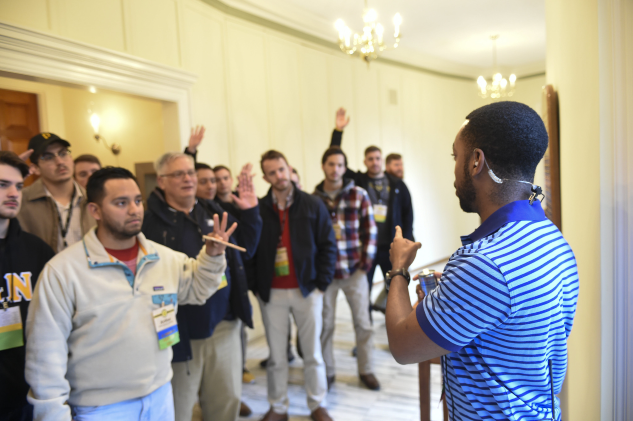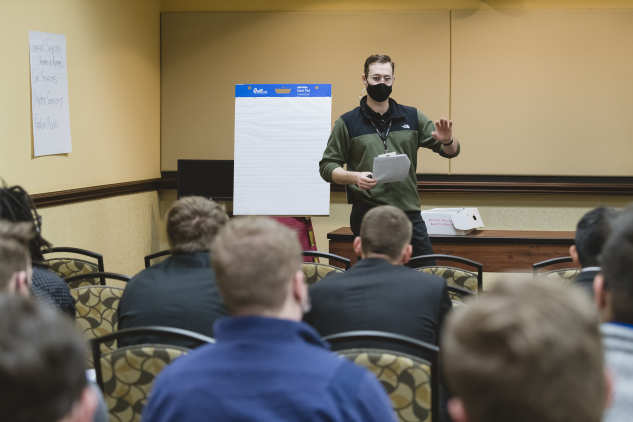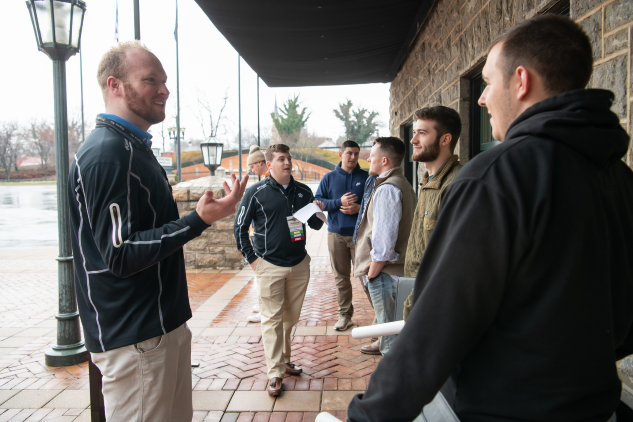Leadership Consultant Program Provides Dedicated Chapter Support and Guidance

The strength of a national fraternity rests on the resiliency within its local chapters - and the chapter leaders who help create it.
This was the vision Sigma Nu Fraternity established in its founding and further strengthened by creating the Leadership Consultant Program five decades ago.
"The consultant program serves as the link between the General Fraternity and each local chapter," explained Scott Smith, Sigma Nu’s Director of Leadership Development. "It provides a dedicated consultant who serves as the direct point of contact and support for the officers of the chapters."
The consultant program traces its roots to the 1950s and underwent significant revisions in the early 2000s with the adoption of the Fraternity's first modern-day, comprehensive strategic plan and the creation of the Pursuit of Excellence Program.
The Strategic Plan and Pursuit of Excellence outlined base-level expectations for chapter performance and expanded the consultant's role into even more of a "hands-on" approach for chapter consultations.
"In the past, much of the consultant's work with a chapter was focused on compliance and gathering demographic and performance data," Smith explained.
Today, the role of the leadership consultant is to be less reactive and more proactive by providing education, instruction, and a continuity model for core functions such as budgeting, leadership development, and member recruitment.
"Each leadership consultant works with the chapters in their portfolio - approximately 25-30 chapters per consultant - devising plans based on case-by-case analysis," Smith explained.
In a typical year, the consultant team conducts more than 3,000 in-person officer meetings (an average of 11+ per chapter per consultation), 500 advisor meetings, and 600 educational programs.
Currently, seven leadership consultants are assigned to the Fraternity's 150+ chapters. All are recent college graduates, which provides a common perspective between the consultant and chapter members.
For Commander Dawson Becker, a sophomore at the University of Idaho, this close age range is beneficial.
"It's great having someone around my age who has a lot of knowledge about Sigma Nu's policies and values and has recent, first-hand experience in managing and running a chapter," explained Becker.
A National Approach to Local Chapter Needs
Just like how each of the fifty states has unique populations, practices, and policies, so does each chapter within the Fraternity. While a "one size fits all" approach is necessary for some instances, other situations require a different approach.
The Fraternity's leadership consulting philosophy is similar to that of a personal trainer. The goal for individuals working with a personal trainer may be the same – to improve health and fitness – but how to reach that goal may vary on the individual. An 80-year-old looking to keep up with the grandkids may need a different plan than a college athlete.
"Chapter issues exist in a local context," Smith explains. "Where one chapter needs the assistance within a given area may not necessarily be the same for another chapter."
To promote standardization while allowing flexibility, consultations afford all chapters a standard, base experience, and an opportunity to customize their time with the consultant.
These two unique parts – the "must-haves" and the "menu" – guide the leadership consultants' work on strategic plans for each chapter.
"Must-haves" are standard elements covered in every chapter consultation with their leadership consultant. The "menu" is a slate of additional meetings, workshops, LEAD sessions, and problem-solving discussions available to chapter leaders to personalize the consultation schedule to the chapter's current goals and needs.
"This allows more focus on relevant needs and deeper conversations with their consultant to assess symptoms and root causes," Smith explains.
Leadership consultants research each chapter and then work with chapter leaders on goals and objectives in developing an improvement plan. The plan may cover a range of areas, including academics, budgeting, candidate education, effective meetings, mental health, officer transitions, recruitment, and team building.
"The leadership consultant discusses the issues with officers in advance of their time on-site so that appropriate meetings, workshops, or action planning time can be added to the consultation schedule," Smith explained.
The connection never ends. Leadership consultants provide ongoing, year-round support to chapters, including multi-day, on-site consultations in the fall and spring. Guidance is provided for day-to-day tasks and when emergencies arise.
Such was the case in the spring of 2020 when every Sigma Nu chapter faced the emergence of the COVID-19 pandemic and looked to the General Fraternity for national guidance to make local decisions.
Leaning On Leadership During the Pandemic

From the Fraternity headquarters in Lexington, Va., the staff team sensed the potential impact of a global pandemic on local chapters.
Smith remained confident the Leadership Consultant Program and its network of leadership consultants would prove invaluable in the coming months.
"I started tracking campus advisories and changes in operations that would affect students in early March 2020," explained Smith. "That led us to pivot to virtual consultations starting on March 12."
The Fraternity was about two-thirds of the way through the spring consultations, leaving sixty consultations that had to be completed virtually.
Smith knew timely and accurate information was essential for all chapters. He also knew consultant support was not just about chapter resiliency, but the wellbeing of each member.
"Leadership consultants helped ensure that officers and the general membership were physically, mentally, emotionally okay," said Smith.
Sigma Nu Fraternity quickly created a coronavirus website that contained a vast library of helpful resources and "best practices" for chapters to access. A comprehensive plan was developed for enhanced hygiene and social distancing protocols and continuity plans for key functions.
Leadership consultants spent much of the remainder of the 2020 school year checking in with chapter officers to provide support and ensure functions critical to the chapter remained in place.
"By May we had created over 60 resources for transitioning and maintaining chapter operations in a virtual format and developed a recruitment webinar series to help chapters shift their approach in the fall," Smith said.
For Becker, who arrived at Idaho in the fall of 2020, the pandemic had disrupted the chapter's milestone events - such as Parent's Weekend, the annual golf tournament, formals, homecoming - which served to build brotherhood and comradery.
He became the chapter Commander his sophomore year, having never experienced these events in person. Most members who had been through these events had graduated, leaving a gap in experience and knowledge. The chapter's leadership consultant, Ryan Perry (Southern Mississippi), was essential in filling the void.
"Having a direct link to my Leadership Consultant made it easy to restore these events this year and even improve them to fit the values and policies of Sigma Nu," Becker said.
Looking Ahead and Lessons Learned
As the 2022 academic year ends, Smith looks to lessons learned over the past two years and is creating structures for the "new normal."
Keeping connections with every chapter during the pandemic proved both a challenge and an accomplishment. Smith said during the 2020-2021 academic year (the first full year of the pandemic), all consultations were conducted virtually and with positive results.
"There was a 200 percent increase in personalized officer training and support time for most officers," he noted, despite the all-virtual format.
As the Fraternity moves to more in-person consultations, Smith believes some elements of a hybrid approach will continue long after the pandemic fades into the background. He envisions virtual check-ins with key officers in the final weeks of the spring term, and the "lead up" to the fall.
Despite its tragedies and disruptions, he also sees the pandemic as a gift of reflection.
"We have an opportunity to help chapters think critically about what new events, practices, and models they create going forward," Smith explains. "In a culture steeped in tradition, it can be hard to make change without an external force requiring you to do so."
He believes the pandemic also deepened the value of empathy, connection, and in-person interactions (when appropriate and safe).
Fraternity, at its core, is about interpersonal connections, support, and shared success. In a world that is becoming more digital, in-person interactions remain significant and impactful.
For Becker, the support of his leadership consultant was instrumental in ensuring the continuity of his chapter. Last October, during his first consultation, he was only two weeks into his Commander position and completely lost on what to do, how to do it, and why he was doing it.
"Knowing that I was fresh into my position and clueless, my consultant not only showed me how to manage my chapter effectively and confidently but to get reason and purpose behind my actions as Commander."
